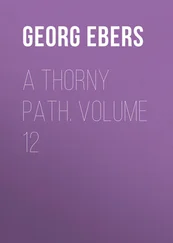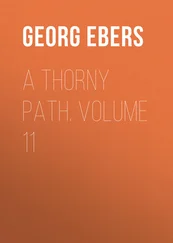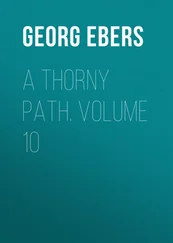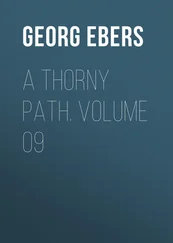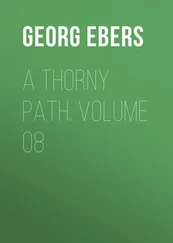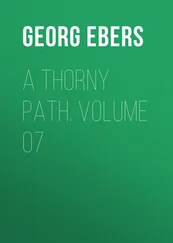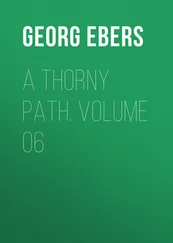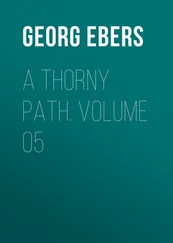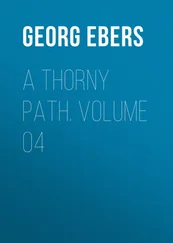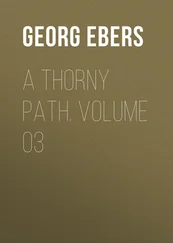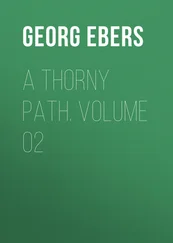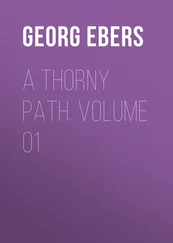Georg Ebers - A Thorny Path. Complete
Здесь есть возможность читать онлайн «Georg Ebers - A Thorny Path. Complete» — ознакомительный отрывок электронной книги совершенно бесплатно, а после прочтения отрывка купить полную версию. В некоторых случаях можно слушать аудио, скачать через торрент в формате fb2 и присутствует краткое содержание. Жанр: foreign_prose, История, foreign_edu, foreign_antique, на английском языке. Описание произведения, (предисловие) а так же отзывы посетителей доступны на портале библиотеки ЛибКат.
- Название:A Thorny Path. Complete
- Автор:
- Жанр:
- Год:неизвестен
- ISBN:нет данных
- Рейтинг книги:5 / 5. Голосов: 1
-
Избранное:Добавить в избранное
- Отзывы:
-
Ваша оценка:
- 100
- 1
- 2
- 3
- 4
- 5
A Thorny Path. Complete: краткое содержание, описание и аннотация
Предлагаем к чтению аннотацию, описание, краткое содержание или предисловие (зависит от того, что написал сам автор книги «A Thorny Path. Complete»). Если вы не нашли необходимую информацию о книге — напишите в комментариях, мы постараемся отыскать её.
A Thorny Path. Complete — читать онлайн ознакомительный отрывок
Ниже представлен текст книги, разбитый по страницам. Система сохранения места последней прочитанной страницы, позволяет с удобством читать онлайн бесплатно книгу «A Thorny Path. Complete», без необходимости каждый раз заново искать на чём Вы остановились. Поставьте закладку, и сможете в любой момент перейти на страницу, на которой закончили чтение.
Интервал:
Закладка:
“Quite right. He was thinking, no doubt, of the miracle-monger of Tyana, Apollonius, who certainly had heard of the doctrine of the Redeemer. But among the thousand nine hundred and ninety, who here bring beasts to the altar, who ever remembers this? Quite lately I heard one of our garden laborers ask how much a day he ought to sacrifice to the sun, his god. I told him a keration—for that is what the poor creature earns for a whole day’s work. He thought that too much, for he must live; so the god must be content with a tithe, for the taxes to the State on his earnings were hardly more.”
“The divinity ought no doubt to be above all else to us,” Melissa observed. “But when your laborer worships the sun, and looks for its benefits, what is the difference between him and you, or me, or any of us, though we call the sun Helios or Serapis, or what not?”
“Yes, yes,” replied Andreas. “The sun is adored here under many different names and forms, and your Serapis has swallowed up not only Zeus and Pluto, but Phoebus Apollo and the Egyptian Osiris and Ammon, and Ra, to swell his own importance. But to be serious, child, our fathers made to themselves many gods indeed, of the sublime phenomena and powers of Nature, and worshiped them admiringly; but to us only the names remain, and those who offer to Apollo never think of the sun. With my laborer, who is an Arab, it is different. He believes the light-giving globe itself to be a god; and you, I perceive, do not think him wholly wrong. But when you see a youth throw the discus with splendid strength, do you praise the discus, or the thrower?”
“The thrower,” replied Melissa. “But Phoebus Apollo himself guides his chariot with his divine hands.”
“And astronomers,” the Christian went on, “can calculate for years to come exactly where his steeds will be at each minute of the time. So no one can be more completely a slave than he to whom so many mortals pray that he will, of his own free-will, guide circumstances to suit them. I, therefore, regard the sun as a star, like any other star; and worship should be given, not to those rolling spheres moving across the sky in prescribed paths, but to Him who created them and guides them by fixed laws. I really pity your Apollo and the whole host of the Olympian gods, since the world has become possessed by the mad idea that the gods and daimons may be moved, or even compelled, by forms of prayer and sacrifices and magic arts, to grant to each worshiper the particular thing on which he may have set his covetous and changeable fancy.”
“And yet,” exclaimed Melissa, “you yourself told me that you prayed for my mother when the leech saw no further hope. Every one hopes for a miracle from the immortals when his own power has come to an end! Thousands think so. And in our city the people have never been more religious than they are now. The singer of the Ialemos at the feast of Adonis particularly praised us for it.”
“Because they have never been more fervently addicted to pleasure, and therefore have never more deeply dreaded the terrors of hades. The great and splendid Zeus of the Greeks has been transformed into Serapis here, on the banks of the Nile, and has become a god of the nether world. Most of the ceremonies and mysteries to which the people crowd are connected with death. They hope that the folly over which they waste so many hours will smooth their way to the fields of the blest, and yet they themselves close the road by the pleasures they indulge in. But the fullness of time is now come; the straight road lies open to all mankind, called as they are to a higher life in a new world, and he who follows it may await death as gladly as the bride awaits the bridegroom on her marriage day. Yes, I prayed to my God for your dying mother, the sweetest and best of women. But what I asked for her was not that her life might be preserved, or that she might be permitted to linger longer among us, but that the next world might be opened to her in all its glory.”
At this point the speaker was interrupted by an armed troop which thrust the crowd aside to make way for the steers which were to be slaughtered in the Temple of Serapis at the approach of Caesar. There were several hundred of them, each with a garland about its neck, and the handsomest which led the train had its horns gilded.
When the road was clear again, Andreas pointed to the beasts, and whispered to his companion “Their blood will be shed in honor of the future god Caracalla. He once killed a hundred bears in the arena with his own hand. But I tell you, child, when the fullness of time is come, innocent blood shall no more be shed. You were speaking with enthusiasm of the splendor of the Roman Empire. But, like certain fruit-trees in our garden which we manure with blood, it has grown great on blood, on the life-juice of its victims. The mightiest realm on earth owes its power to murder and rapine; but now sudden destruction is coming on the insatiate city, and visitation for her sins.”
“And if you are right—if the barbarians should indeed destroy the armies of Caesar,” asked Melissa, looking up in some alarm at the enthusiast, “what then?”
“Then we may thank those who help to demolish the crumbling house!” cried Andreas, with flashing eyes.
“And if it should be so,” said the girl, with tremulous anxiety, “what universal ruin! What is there on earth that could fill its place? If the empire falls into the power of the barbarians, Rome will be made desolate, and all the provinces laid waste which thrive under her protection.”
“Then,” said Andreas, “will the kingdom of the Spirit arise, in which peace and love shall reign instead of hatred and murder and wars. There shall be one fold and one Shepherd, and the least shall be equal with the greatest.”
“Then there will be no more slaves?” asked Melissa, in growing amazement.
“Not one,” replied her companion, and a gleam of inspiration seemed to light up his stern features. “All shall be free, and all united in love by the grace of Him who hath redeemed us.”
But Melissa shook her head, and Andreas, understanding what was passing in her mind, tried to catch her eye as he went on:
“You think that these are the impossible wishes of one who has himself been a slave, or that it is the remembrance of past suffering and unutterable wrong which speaks in me? For what right-minded man would not desire to preserve others from the misery which once crushed him to earth with its bitter burden?—But you are mistaken. Thousands of free-born men and women think as I do, for to them, too, a higher Power has revealed that the fullness of time is now come. He, the Greatest and Best, who made all the woes of the world His own, has chosen the poor rather than the rich, the suffering rather than the happy, the babes rather than the wise and prudent; and in his kingdom the last shall be first—yea, the least of the last, the poorest of the poor; and they, child, are the slaves.”
He ended his diatribe with a deep sigh, but Melissa pressed the hand which held hers as they walked along the raised pathway, and said: “Poor Andreas! How much you must have gone through before Polybius set you free!”
He only nodded, and they both remained silent till they found themselves in a quiet side street. Then the girl looked up at him inquiringly, and began again:
“And now you hope for a second Spartacus? Or will you yourself lead a rebellion of the slaves? You are the man for it, and I can be secret.”
“If it has to be, why not?” he replied, and his eyes sparkled with a strange fire. But seeing that she shrank from him, a smile passed over his countenance, and he added in a soothing tone: “Do not be alarmed, my child; what must come will come, without another Spartacus, or bloodshed, or turmoil. And you, with your clear eyes and your kind heart, would you find it difficult to distinguish right from wrong, and to feel for the sorrows of others—? Yes, perhaps! For what will not custom excuse and sanctify? You can pity the bird which is shut into a cage too small for it, or the mule which breaks down under too heavy a load, and the cruelty which hurts them rouses your indignation. But for the man whom a terrible fate has robbed of his freedom, often through the fault of another, whose soul endures even greater torments than his despised body, you have no better comfort than the advice which might indeed serve a philosopher, but which to him is bitter mockery: to bear his woes with patience. He is only a slave, bought, or perhaps inherited. Which of you ever thinks of asking who gave you, who are free, the right to enslave half of all the inhabitants of the Roman Empire, and to rob them of the highest prerogative of humanity? I know that many philosophers have spoken of slavery as an injustice done by the strong to the weak: but they shrugged their shoulders over it nevertheless, and excused it as an inevitable evil; for, thought they, who will serve me if my slave is regarded as my equal? You only smile at this confusion of the meditative recluses, but you forget”—and a sinister fire glowed in his eyes—“that the slave, too, has a soul, in which the same feelings stir as in your own. You never think how a proud man may feel whose arm you brand, and whose very breath of life is indignity; or what a slave thinks who is spurned by his master’s foot, though noble blood may run in his veins. All living things, even the plants in the garden, have a right to happiness, and only develop fully in freedom, and under loving care; and yet one half of mankind robs the other half of this right. The sum total of suffering and sorrow to which Fate had doomed the race is recklessly multiplied and increased by the guilt of men themselves. But the cry of the poor and wretched has gone up to heaven, and now that the fullness of time is come, ‘Thus far, and no farther,’ is the word. No wild revolutionary has been endowed with a giant’s strength to burst the bonds of the victims asunder. No, the Creator and Preserver of the world sent his Son to redeem the poor in spirit, and, above all, the brethren and the sisters who are weary and heavy laden. The magical word which shall break the bars of the prisons where the chains of the slaves are heard is Love.... But you, Melissa, can but half comprehend all this,” he added, interrupting the ardent flow of his enthusiastic speech. “You can not understand it all. For you, too, child, the fullness of time is coming; for you, too, freeborn though you are, are, I know, one of the heavy laden who patiently suffer the burden laid upon you. You too—But keep close to me; we shall find it difficult to get through this throng.”
Читать дальшеИнтервал:
Закладка:
Похожие книги на «A Thorny Path. Complete»
Представляем Вашему вниманию похожие книги на «A Thorny Path. Complete» списком для выбора. Мы отобрали схожую по названию и смыслу литературу в надежде предоставить читателям больше вариантов отыскать новые, интересные, ещё непрочитанные произведения.
Обсуждение, отзывы о книге «A Thorny Path. Complete» и просто собственные мнения читателей. Оставьте ваши комментарии, напишите, что Вы думаете о произведении, его смысле или главных героях. Укажите что конкретно понравилось, а что нет, и почему Вы так считаете.

